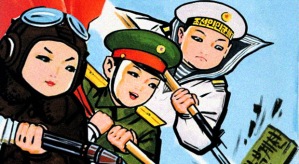 (NKnews.org March 30, 2013) North Korea is entering a “state of war” with South Korea, according to a statement made this morning by the Korea Central News Agency (KCNA). Pyongyang’s latest warning pointed out that U.S. bases in Hawaii and Guam would be targeted in what could turn into “an all-out war, a nuclear war.”
(NKnews.org March 30, 2013) North Korea is entering a “state of war” with South Korea, according to a statement made this morning by the Korea Central News Agency (KCNA). Pyongyang’s latest warning pointed out that U.S. bases in Hawaii and Guam would be targeted in what could turn into “an all-out war, a nuclear war.”
“From this moment, the North-South relations will be put at the state of war, and all the issues arousing between the North and the South will be dealt with according to the wartime regulations,” North Korean state media outlet KCNA said today. “If the U.S. and the South Korean puppet group perpetrate a military provocation for igniting a war against the DPRK (North Korea) in any area… it will not be limited to a local war but develop into an all-out war, a nuclear war”. KCNA added that the “time has come to stage a do-or-die final battle”.
But despite the increasing rhetoric, Denis Samsonov, a public relations officer working at the Russian embassy in North Korea, told Russia’s NTV that the situation in Pyongyang remains “calm”. “Basically, life in the city is as usual…We are witnessing no tension.” The Russian Foreign Ministry ambassador at large, Grigoriy Logvinov, told Interfax News that although he hoped all sides would “show restraint”, Russia would not “remain uninvolved under conditions when tension is fomenting near our eastern borders”.
Leonid Petrov, an Australian National University Korean Studies Researcher, told NK NEWS that the ”state of war” marked a sharp turning point. “After 60 years of slow-motion war thinly covered by the 1953 Armistice Agreement, Pyongyang has finally found the courage to call a spade a spade. The ambiguity of the current situation is no longer tolerable for North Korea, who is tired of sanctions, double standards, and nuclear bullying.” He added, “Neither peace nor war has led to famine, stagnation or isolation of this rich and strategically important part of Northeast Asia. By proclaiming “state of war” with South Korea, Kim Jong Un is simply reminding the world about this unresolved problem, inherited from the Cold War era.”
Despite the increase in rhetoric, a military source told South Korean news agency Yonhap News that the Korean People’s Army was not currently showing signs of war preparations or unusual moves. Yonhap added that the South Korean defense ministry viewed the latest statement as an”unacceptable threat that hurts peace and stability on the Korean Peninsula”.
In the U.S., the White house said that it would be taking North Korea’s threats seriously. ”We’ve seen reports of a new and unconstructive statement from North Korea,” Caitlin Hayden, spokeswoman for the National Security Council told AFP.
Steve Chung, a Research Fellow at Seoul’s Institute for Far Eastern Studies, said the “state of war” was merely a new deployment of old North Korean rhetoric. “We have seen Pyongyang using similar verbal threats before. North Korea has routinely warned Seoul of things like a ‘Sea of Flames’, ‘Sacred War’, and even ‘Pre-Emptive Nuclear Strikes’. So while this is a revision of previous rhetoric, it may only have a limited effect.” Chung added, “the two Koreas are still technically in a ‘state-of-war’, because the 60 year old armistice only serves as a temporarily halt to war, not an end to the Korean War.”
Meanwhile, Beijing based experts talking to Chinese media said that Thursday’s deployment of B-2 bombers, which can carry up to 16 nuclear weapons, was a “shock-and-awe” symbol of U.S. escalation. On CCTV’s “Focus Today”, North Korea expert Li Li said the bombers’ deployment was a reflection of the U.S. attempt to “counter North Korea’s nuclear weapons with nuclear weapons.” Xinhua News, a Chinese state news outlet, pointed out that “it’s time for both sides to take a step back and let the cooler minds prevail”, weary of the escalation of threat.
However, North Korean media added in a later bulletin that in the event of conflict, victory would be “certain”. Pyongyang has threatened attacks almost daily since it was sanctioned for its February nuclear test. Some observers suggest the threats indicate the potential of regime instability. Few think though that North Korea will follow up and actually commence major hostilities.
The latest rhetoric appears to be a tit-for-tat response to Thursday’s U.S. stealth bomber training that saw two B-2’s fly from Missouri to drop ordinance on an island in the southern half of the Korean peninsula. U.S. officials said the flights were not designed to raise tensions, but reduce them by bolstering deterrence in face of North Korea’s recent vitriolic provocations.
Both Pyongyang and Seoul have labelled each other’s rhetoric as ‘provocative’ in recent weeks, and their own military exercises as ‘defensive’. North Korea has declared the peace agreement that ended the Korean War to be “void”, and has threatened preemptive nuclear strikes on both Japan and the U.S.
—









You must be logged in to post a comment.